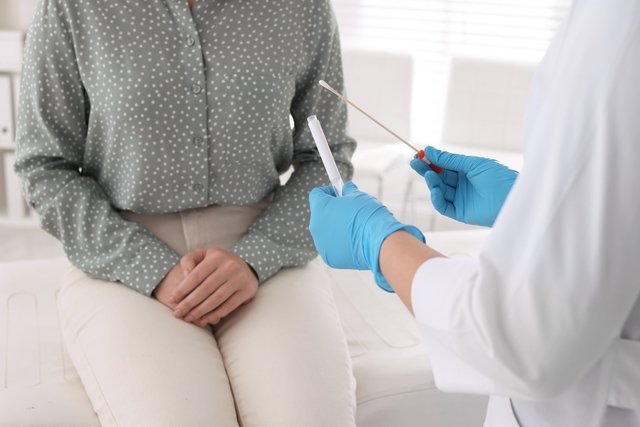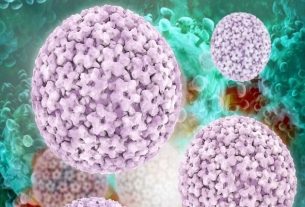Genital herpes is a sexually transmitted infection caused by the virus Herpes simplexwhich can be transmitted through sexual intercourse without a condom or through direct contact with lesions in the genital region caused by the virus.
The main sign of infection with the herpes virus is usually the appearance of lesions and vesicles in the genital region, which can cause pain and discomfort and be accompanied by other symptoms such as general malaise, fever and muscle pain, for example.
It is important that the gynecologist or urologist is consulted as soon as the presence of a wound in the genital region is identified, as this allows treatment to begin to reduce the rate at which the virus multiplies, treat the lesions and prevent transmission.

Symptoms of genital herpes
The most common symptoms of genital herpes are:
- Appearance of vesicles and blisters in the genital region;
- Exit of liquid through the vesicles;
- Local redness;
- Burning, pain and itching in the genital region;
- Discomfort when urinating and/or defecating, depending on the location of the wounds.
The symptoms of genital herpes usually appear between 10 and 15 days after contact with the virus, with the main symptoms being on the penis and vulva. However, lesions can also appear in the vaginal region, cervix and near the anal region. See more details on the symptoms of genital herpes.
Online symptom test
To find out your chances of having genital herpes, please select the symptoms you have:
This test serves as a guide only. Therefore, it is not intended to provide a diagnosis and does not replace consultation with a urologist, gynecologist or infectious disease specialist.
How to confirm the diagnosis
To confirm genital herpes infection, it is important to consult a gynecologist, in the case of women, or a urologist, in the case of men.
The initial diagnosis of genital herpes is made by the doctor based on the evaluation of the signs and symptoms presented. If the presence of lesions suggestive of genital herpes is identified, the doctor may order blood and wound secretion tests to identify the presence of the herpes virus and confirm the diagnosis.
Don’t ignore the signs your body is giving you!
The main way genital herpes is transmitted is through unprotected sexual intercourse, that is, without a condom, whether vaginal, anal or oral.
In addition, the virus can be transmitted through contact with wound secretions or through contact with the vaginal or penile secretions of a person with an active infection. Herpes simplex. Learn more about the transmission of genital herpes.
Read too: Herpes: what it is, symptoms, types, transmission and treatment
Treatment for genital herpes
Treatment for genital herpes must be guided by a doctor, and the use of antiviral tablets, such as Aciclovir, Famciclovir or Valacyclovir, is normally recommended for around 7 days or according to medical advice. Check out more details on the treatment for genital herpes.
Ointments for genital herpes
In some cases, the doctor may also recommend the use of ointments, which should be applied directly to the herpes sores. These ointments have antiviral properties, which help reduce the rate at which the virus multiplies, relieving symptoms and preventing transmission of the disease.
Do you care about genital herpes?
There is no cure for genital herpes, as the virus cannot be eliminated from the body, remaining in the cells in its “dormant” form and can be activated when the immune system is weakened.
Although there is no cure, it is possible to control the symptoms and reduce the risk of transmitting the virus to other people by following the treatment recommended by your doctor. Learn how to control genital herpes.
How to prevent
The main way to prevent genital herpes is through the use of condoms in all sexual relations, avoiding having sexual relations with people who have lesions in the genital region that are possibly indicative of infection by the herpes virus and avoiding contact with vaginal secretions and peniles.
Bibliography
- GROVES, Mary J. Genital Herpes: A Review. Am Fam Physician. Vol.93(11). 928-934, 2016
- PENELLO, Angelo M. et al. Herpes Genital. J bras Diseases Sex Transm. Vol.22(2). 64-72, 2010
- PENELLO, Angelo M. et al. Herpes Genital. J bras Diseases Sex Transm. Vol.22(2). 64-72, 2010
- DIVE – EPIDEMIOLOGICAL SURVEILLANCE DIRECTORATE. Herpes Genital. Available at: <http://www.dive.sc.gov.br/index.php/da/item/herpes-genital>. Accessed on March 7, 2022
- BRAZILIAN SOCIETY OF INFECTOLOGY. Herpes Simples. Available at: <https://www.infectologia.org.br/pg/985/herpes-simples>. Accessed on March 7, 2022
- INTERNATIONAL JOURNAL OF STD & AIDS. 2017 European guidelines for the management of genital herpes. . . . 2017. Available at: <https://www.iusti.org/regions/europe/pdf/2017/Herpes.pdf>. Accessed 07 Mar
- BARER, Michael R. et al. Medical Microbiology – A guide to microbial infections: pathogenesis, immunity, laboratory investigation and control. ed 19. Elsevier, 2018. 371-377.
- RAMOS, Mauro C.; SARDINHA, José Carlos; ALENCAR, Herculano DR et al. Brazilian Protocol for Sexually Transmitted Infections 2020: infections that cause genital ulcers. Epidemiol. Serv. Saude. Vol 30. 2021

Sign up for our newsletter and stay up to date with exclusive news
that can transform your routine!
Warning: Undefined array key "title" in /home/storelat/public_html/wp-content/plugins/link-whisper-premium/templates/frontend/related-posts.php on line 12
Warning: Undefined array key "title_tag" in /home/storelat/public_html/wp-content/plugins/link-whisper-premium/templates/frontend/related-posts.php on line 13



